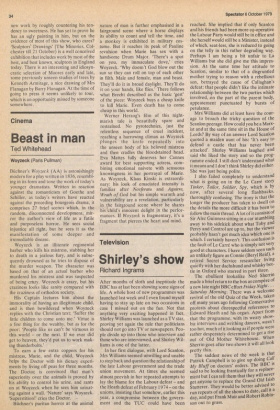Shirley's show
Richard Ingrams
After months of sloth and ineptitude the BBC has at last been showing some signs of life. A whole host of new programmes was launched last week and I even found myself having to stay up late on two occasions in case I missed out on the fun. Not that anything very exciting happened in fact. Shirley Williams was launched as a TV star, proving yet again the rule that politicians should not go into TV or newspapers, People divide up into those who interview and those who are interviewed, and Shirley Williams is one of the latter.
In her first dialogue, with Lord Scanlon, Mrs Williams seemed unwilling and unable to step back and question the relationship of the late Labour government and the trade union movement. At times she seemed almost peevish in her repeated attempts to lay the blame for the Labour defeat — and the Heath defeat of February 1 974 — on the unions, insisting that somehow, earlier this year, a compromise between the government and the TUC could have been reached. She implied that if only Scanlon and his friends had been more co-operative the Labour Party would still be in office and she herself would still be a Minister, instead of which, seat-less, she is reduced to going on the telly in this rather degrading way. Perhaps I am being a bit unfair to La Williams but she did give me this impression. At the same time her attitude to Scanlon, similar to that of a disgruntled mother trying to reason with a rebellious son, betrayed the cause of Callaghan's defeat: that people didn't like the intimate relationship between the two parties which involved, on the part of the parent body, appeasement punctuated by bursts of petulance.
Mrs Williams did at least have the courage to broach the tricky question of the Scanlon peerage. How could you be a Marxist and at the same time sit in the House of Lords? By way of an answer Lord Scanlon quoted a maiden aunt of his: 'It's easy to defend a castle that has never been attacked'. Shirley Williams laughed and said she liked the story and so the programme ended. I still don't understand what it means and I don't think Shirley did either. She was just being polite. I also failed completely to understand what is going on in the Le Carre story Tinker, Tailor, Soldier, Spy, which is by now, after several long flashbacks, thoroughly confusing. The irony is that the longer the producer has taken to dwell on the details the more difficult it has been to follow the main thread. A lot of it consists of Sir Alec Guinness sitting in a car mumbling away to his sidekick about what Toby and Percy and Control are up to, but the viewer probably hasn't got much idea which one is which. I certainly haven't. This confusion is the fault of Le Carre who is simply not very good at characters. I have seldom seen such an unlikely figure as Connie (Beryl Reid), a retired Secret Service researcher , living quietly with her dachshund and whisky bottle in Oxford who starred in part three. The ebullient lookalike Ned Sherrin made a brief return to the box as compere of a new late night BBC effort Friday Night. • • Saturday Morning, There was a welcome revival of the old Quiz of the Week, taken off many years ago following Conservative protests about disrespectful references to Edward Heath and his organ. Apart from that the programme, with its weary showbiz interviews and writhing dancers, wasn't too hot, much of it looking as if people were rather desperately determined to get a rise out of Old Mother Whitehouse. When Sherrin goes after two shows it will all look pretty thin. The saddest news of the week is that Patrick Campbell is to give up doing Call My Bluff on doctors' orders. The BBC is said to be looking frantically for a replacement but I can tell them that they will never get anyone to replace the Grand Old Irish Stutterer. They would be better advised to run repeats of all the shows to date, call it a day, and put Frank Muir and Robert Robinson out to grass.










































 Previous page
Previous page